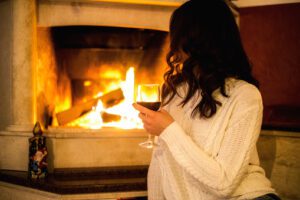Picture this, it’s the first snow of the season and you’re curled up beside a crackling fire on a cold night. There is nothing better than the warm comfort of a wood stove on a chilly night, but with that comfort comes a great deal of risk. If you have a wood or pellet stove in your home, you should consider some of the tips below to keep your family warm and safe all winter long.
Wood stove safety tips.
Keep these tips in mind for safe and efficient wood stove use:
- Keep it clean. The buildup of soot can significantly reduce the heat transfer efficiency of your wood stove. To get the most out of your wood stove you, clean out the inside of it with a wire brush once a month.
- Use seasoned wood. Freshly chopped wood is too wet to burn in your wood stove this causes extra smoke and a buildup of creosote in your chimney (which can start a chimney fire). “Seasoned wood” is wood that has been cut, split, and left to dry for over 6 months — and this is what you should burn in your wood stove.
Pellet stove safety tips.
These tips will help keep you safe and your stove running efficiently all winter.
- Clean it often. Pellet stoves need to be cleaned more often than wood stoves — usually once a week during heating season They also need to be cleaned by a professional at least once a year.
- Follow the rules. With a pellet stove it is important to follow the manufacturer’s instructions for operation, cleaning, and maintenance. Only use the type of pellets that are recommended for your specific model of stove.
- Charge your batteries. If the power goes out while your pellet stove is running, the fan system could stop working and cause smoke to pour into your house. Be sure you have a working battery backup system to keep the fans running long enough to finish burning the pellets in the chamber so you can safely turn your heater off and prevent smoke damage.
How does installing a wood stove or pellet stove affect your home insurance?
Cuddling up beside your wood or pellet stove might keep you cozy, but these are also two of the riskiest heating systems to have in your home. We’re not saying to throw out a perfectly good stove, but if you are having second thoughts and are looking to install a new heating system. be sure to contact your local insurance broker to help you make an informed choice so that there aren’t any surprises down the road.
Whether you plan to stick with what you have or you’re looking for an alternative heating system to reduce your energy consumption and lower your heating bills, there are several safe and efficient systems on the market. Some options include heat pumps, solar systems, geothermal systems, and more. Be sure to reach out to your licensed insurance broker to learn about your options and how they might affect your insurance.


